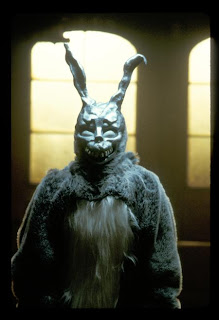Recently I watched the films
“Donnie Darko” by Richard Kelly and “The Butterfly Effect” by Eric Bress and J. Mackye
Gruber back to back. Both of
these films are categorized as psychological thrillers and both films have many similarities in their plots. Both films played with the time space continuum, both films had characters who have supernatural experiences/powers, and both films featured a troubled protagonist you
follow through it all. Despite these
films similarities at the end I found that I disliked “Donnie Darko” but loved “The
Butterfly Effect,” and I had to ask myself, “Why?”
“Donnie
Darko” is the story of a teenager named Donnie Darko who hallucinates and sees a demonic
bunny named Frank. The bunny will put
Donnie in a trancelike state and Donnie will do his bidding. One day Frank makes Donnie sleepwalk out
of his house, saving his life as a jet turbine that falls from the sky and crashes into his room. As the story goes on Donnie feels like he
owes the bunny for saving his life and his hallucinations get progressively
worse until he feels as though he has discovered time travel. In the end Donnie uses his “new found
knowledge” to alter the past (I don’t want to ruin the ending so I wont get too
specific). However at the end of the movie I felt disappointed and almost annoyed.
As I mulled the movie over in my
head I began to realize why I found the story so disinteresting. When the plot is broken down the entire film
is based off a hallucination bunny saving Donnie from a mysterious airplane
turbine. Although the airplane turbine was eventually explained it was still too far fetched of a conclusion to be satisfying. I feel that although it was
well filmed, directed, edited and shot but the fact of the matter was the plot was not cohesive or believable enough for me. I
feel as though if the central event of the film was more realistic then I would have been
able to get more into the movie.
Inversely, this idea that the
script and plot are central to the film is a main reason why I enjoyed “The
Butterfly Effect” so much. Although the
central plot point of this film is about a young man named Evan Treborn has a
supernatural power to travel into his past it was so well set up and well
developed that this seemingly far fetched idea became believable. The
teleportation of Evan back in time in order to save his future and the futures
of those he loved was beautifully executed.
The ability of the film to catch the audience up to the “new present,”
transforming years into only seconds was amazing. However what really impressed
me was the preservation of cause and effect in the film and the realism of the
outcomes, or new futures, that were created though Evan’s travels into the past. The writer/filmmakers also had an
understanding of their audience. This is
apparent when the filmmakers play into everyone’s worst fear that the
protagonist Evan is in fact insane and that he has been imagining his flashbacks the whole
thing.
I feel as though these movies stand
as prime examples for what good writing can do as well as the determents of
having an unbelievable storyline. In the
genre of “psychological thriller” the plot is imperative to the success of the
film in the eyes of the viewer. In my
opinion if things do not come full circle and there is no clear/or realistic
revolution, especially for this genre of film, the film will not satisfy the
viewer. It goes to show that, for the
most part, even if you shoot a beautiful film if the script/storyline are
not compelling or believable then in the end the audience will not be
satisfied.



No comments:
Post a Comment